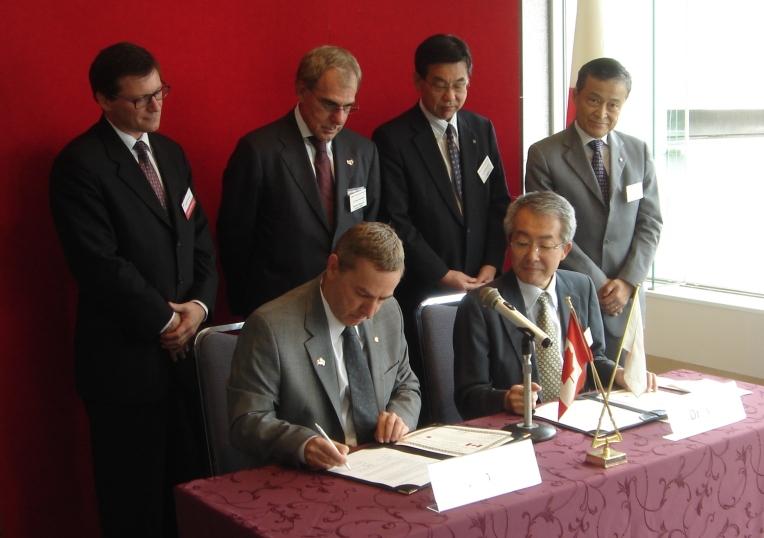Commemorating the 80th anniversary of diplomatic relations between Japan and Canada, and in keeping with the theme of Innovation, the Canadian Embassy in Tokyo, hosted the inaugural Canada - Japan Particle Accelerator Science Symposium. The symposium showcased the Canadian and Japanese accelerator research and discussed collaborative partnerships by the two countries.
TRIUMF director Nigel S. Lockyer was one of the invited speakers. Director Emeritus Erich Vogt was also invited to speak about the history of scientific collaboration as well as the significance of the opening of the latest premier facility in Japan, the Japan Proton Accelerator Research Centre (J-PARC). In many regards, the J-PARC facility represents the fruition of the KAON project that began in Canada more than two decades ago but did not materialize.
The program featured presentations by leading researchers in particle accelerator science from Japan's High Energy Accelerator Research Organization (KEK) and Canada's National Laboratory for Particle and Nuclear Physics (TRIUMF). There were also presentations on the Canadian participation in the international Tokai-to-Kamioka (T2K) Long Baseline Neutrino Oscillation Experiment as well the RIKEN Nishina Centre and its Rare Isotope Beam Factory which is adding new dimensions to the facility's present capabilities. Potential medical applications of accelerator beams and isotopes were also explored. Following the presentations, there was a panel discussion concerning the importance of and prospects for Canada-Japan collaboration in international accelerator projects and the future of accelerator science and technology.
Pierre Coulombe, President of National Research Council Canada, gave the key note address and discussed the reasons for global collaboration in science and technology. Nigel Lockyer discussed the history of Canada-Japan collaboration through TRIUMF and KEK Director Atsuto Suzuki did the same through the eyes of KEK. Dean Karlen from the University of Victoria described the T2K experiment. Director of the RIKEN Nishina Centre Yasushige Yano described the new Rare Isotope Beam Factory. Hirohiko Tsujii leads the National Institute of Radiological Sciences in Japan and discussed medical applications of particle beams.

Also featured on the occasion of this event was the announcement of the signature of a formal Memorandum of Understanding (MOU) between TRIUMF and the RIKEN Nishina Centre for Accelerator-Based Science. The MOU outlines collaborations on the study of accelerator-based science including accelerator development, theoretical and experimental research.
Jean-Michel Poutissou, head of nuclear medicine at TRIUMF and emeritus associate director, worked with Professor William Trischuk of the University of Toronto to help organize the event.
--By T.I. Meyer, Head of Strategic Planning and Communications at TRIUMF
